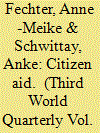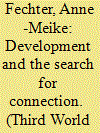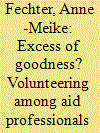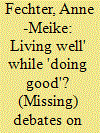|
|
|
Sort Order |
|
|
|
Items / Page
|
|
|
|
|
|
|
| Srl | Item |
| 1 |
ID:
168472


|
|
|
|
|
| Summary/Abstract |
The introduction to this collection brings together, under the umbrella terms of citizen aid and grassroots humanitarianism, interdisciplinary research on small-scale, privately funded forms of aid and development. It notes the steady rise of these activities, including in the Global South as well as North, such as in the context of the recent European refugee crisis. It considers their position vis-à-vis more institutionalised forms of aid; methodological approaches and their challenges; and asks what political dimensions these initiatives may have. It outlines key themes arising from the contributions to the collection, including historical perspectives on ‘demotic humanitarianism’, questions of legitimacy and their apparent lack of professionalisation, motivations of their founders, the role of personal connections, as well as the importance of digital media for brokerage and fundraising. Being mindful of its critiques and implicit power imbalances, it suggests that citizen aid deserves more systematic academic attention.
|
|
|
|
|
|
|
|
|
|
|
|
|
|
|
|
| 2 |
ID:
168475


|
|
|
|
|
| Summary/Abstract |
The stated purpose of development is often characterised by the motivation to ‘help’ – that is, to intervene in the lives of others in supportive ways. This paper argues that this perspective has obscured how development activities are also animated by its twin desire to ‘connect’. While this holds significance for development more broadly, it becomes particularly evident in a mode of assistance that has gained prominence more recently. These are privately funded, small-scale projects led by individual founders, here described as ‘citizen aid’. Based on ethnographic research among citizen aid initiatives in Cambodia, the paper argues that the relevance of ‘connecting’ has been insufficiently recognised so far. It explores different aspects of what participants mean by ‘making a connection’, including face-to-face contact, direct experience of aid activities, and their tangible efficacy. It also finds that establishing interpersonal relationships across national, ethnic and cultural differences, while potentially challenging, is a key motivation for those involved. Finally, the paper argues that acknowledging the desire to connect questions notions of the ‘distant stranger’ as the archetypical humanitarian object, highlighting the wish for familiarity and closeness as potentially just as important for motivating and directing assistance to others.
|
|
|
|
|
|
|
|
|
|
|
|
|
|
|
|
| 3 |
ID:
155718


|
|
|
|
|
| Summary/Abstract |
This article explores the meaning of volunteering among professional aid workers. While they experience disenchantment in their daytime work, volunteering provides them with benefits lacking in their paid jobs. At the same time, a compensatory model does not capture the complex dimensions of this relationship. One motive behind their professional work – bringing about positive change for others – is also the driving force behind their voluntary practices. Such excess of doing good may be indicative of their overall commitment. If aid workers make sense of their actions within a framework of alienated labour, rendering their waged aid work as a commodity, volunteering emerges as a remedial response. At the same time, their paid and unpaid work is animated by the impulse of giving. Such co-existence implies that gifts and commodities are not mutually exclusive; or indeed that both can be understood, following Parry (1986), as emerging from a highly developed capitalist system.
|
|
|
|
|
|
|
|
|
|
|
|
|
|
|
|
| 4 |
ID:
116860


|
|
|
|
|
| Publication |
2012.
|
| Summary/Abstract |
This paper takes at its starting point public criticism of international aid workers who appear to be 'doing well out of poverty'. Based on fieldwork in Cambodia, the paper suggests that such public perceptions are mirrored by some aid workers' uncertainties about the moral dimensions of their own and others' lifestyles. Significantly, analyses of such public and private unease are largely absent from development ethics, even though comparable professions, such as nursing or social work, having produced substantial work on these issues. I argue that the scarcity of equivalent studies in development studies is partly the result of a tendency to foreground the 'other'-the world's poor-while rendering those who deliver aid invisible. Placing 'aid recipients' and 'aid givers' in separate categories, together with an emphasis on collective rather than individual moral responsibilities, not only makes it difficult to conduct open debates on the role of altruism and professionalism among aid workers, but also indicates how practices of 'othering' continue to inform aspects of development theory and practice.
|
|
|
|
|
|
|
|
|
|
|
|
|
|
|
|
|
|
|
|
|